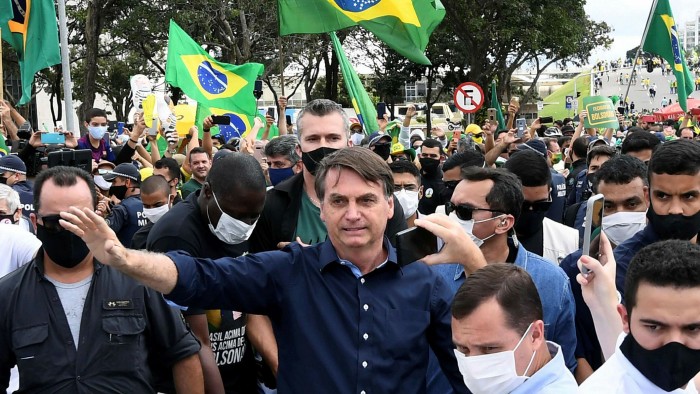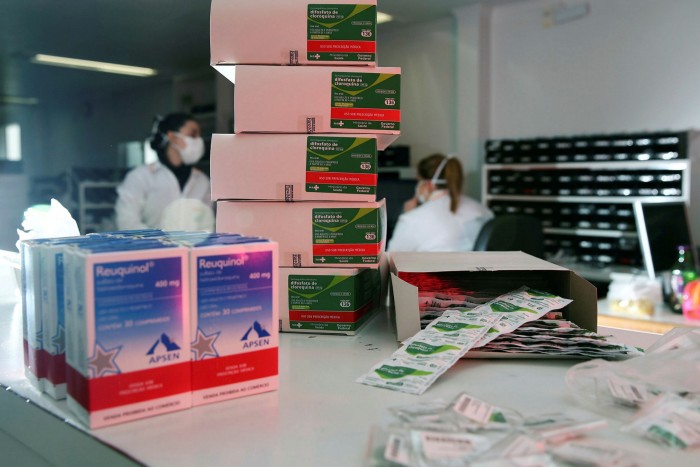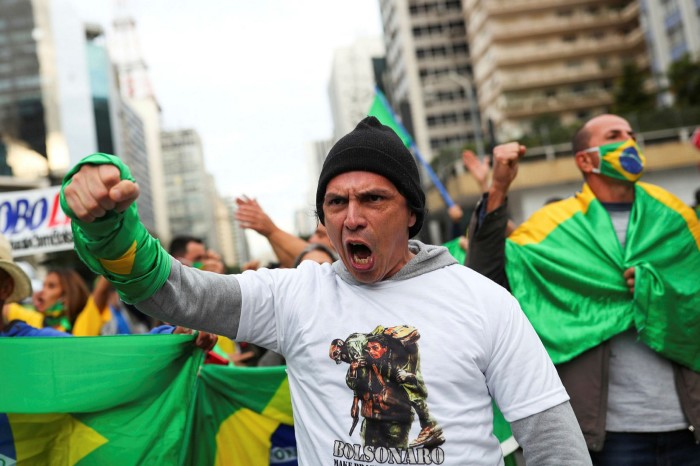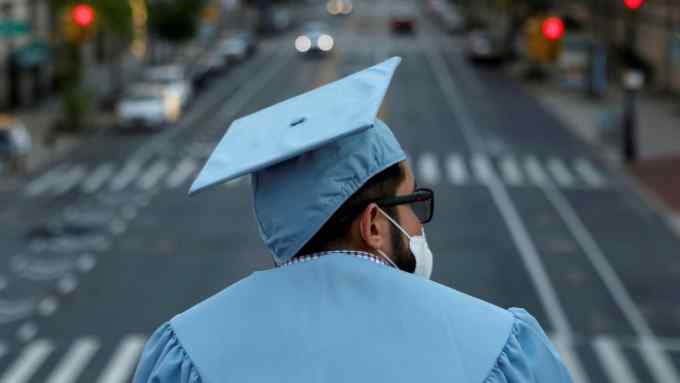Brazil’s chloroquine battles: ‘They were saying they were going to kill me’ | Free to read

Simply sign up to the Americas politics & policy myFT Digest -- delivered directly to your inbox.
When Brazilian infectologist Marcus Lacerda published research questioning the efficacy of the antimalarial drugs chloroquine and hydroxychloroquine on patients infected with the novel coronavirus, he received death threats from alleged followers of President Jair Bolsonaro.
“People were saying that they were going to kill me, that they were going to kill my family so I would know what it was like to lose someone,” said Mr Lacerda, a former president of the Brazilian Society of Tropical Medicine. “Because Bolsonaro said the drug worked, people started to defend the drug to defend the president. It became totally a political issue.”
With scientists facing death threats if they question their efficacy and the army under orders to increase production, battles over the antimalarial drugs touted by some as a cure for Covid-19 have stepped up as Brazil has become a global hotspot for the infection.

Chloroquine and hydroxychloroquine are at the centre of Mr Bolsonaro’s push to end the state-ordered lockdowns he has repeatedly criticised and reopen Latin America’s largest economy. Former health officials say that he has been taking cues from US president Donald Trump, who branded hydroxychloroquine a “game-changer”.
Mr Bolsonaro has lost two health ministers in less than a month, in part because of the president’s push for antimalarials. A medical doctor who recently resigned from his senior position at the health ministry said Mr Bolsonaro sees the drugs as a “miraculous cure for people to feel safe enough to go back to the streets”.
Hydroxychloroquine and chloroquine have long been used to treat malaria and some autoimmune conditions. There has been some experimental use of the drugs recently both to prevent and to treat Covid-19, but several countries have cautioned against it. France this week banned their use after the World Health Organization suspended a large-scale trial.
With more than 438,000 infections, the world’s second-largest number of cases after the US, Mr Bolsonaro is using the drugs to deflect public attention from his botched response to the outbreak, argue senior scientists at the Oswaldo Cruz Foundation, also known as Fiocruz, a respected state-backed health research institute that also produces drugs.

“The chloroquine issue is a justification for not adopting important measures of social distancing,” said Júlio Croda, an epidemiologist who stepped down as head of the health ministry’s department of immunisation and transmissible diseases because he opposed the president’s stance.
Almost 27,000 Brazilians have died from the disease, and the country continues to report an alarming number of deaths — now about 1,000 — daily. Experts at the Getúlio Vargas Foundation estimate the total number of infections could top 34m by the end of the pandemic. Still, such numbers have not deterred the president’s supporters from protesting against state lockdowns with placards featuring pictures of chloroquine pills and saying “Bolsonaro is right”. Brazilian media labelled the protesters “chloroquiners”.
Mr Bolsonaro’s push for chloroquine began on March 21, only days after state governors declared lockdowns that infuriated the president. Wearing rubber sandals, loose bermudas and a football shirt, he said in a homemade video that doctors were researching the effects chloroquine could have on Covid-19 patients.
He “immediately” ordered the Brazilian army’s laboratory — which produces about a third of the medicines used in the country’s public health system — to ramp up production of the drug.
In Brazil, the debate is now so heated that scientists such as Mr Lacerda are facing a judicial investigation over clinical trials that showed the antimalarials caused potential “hazards” for patients of Covid-19. The judicial investigation followed accusations on Twitter by Eduardo Bolsonaro, one of the president’s sons and a congressman, that the scientists were leftist lackeys running an “absurd” study that “should be investigated immediately”.
The former senior health officials say the office of the president’s chief of staff, a general, is “fostering chloroquine” on behalf of Mr Bolsonaro. The chief of staff’s office did not respond to questions. Last week, the health ministry — now run on an interim basis by a military officer with no experience in healthcare — issued nationwide guidelines for the use of chloroquine and hydroxychloroquine.

The health ministry said in a note to the Financial Times that it was following “bioethical principles” in its promotion of both drugs. It has distributed 2.9m chloroquine pills nationwide. They were produced locally by the army’s laboratory and Fiocruz, also at the heart of the domestic drugs market. Officials said the ministry was “negotiating” further acquisitions from both institutions, adding that private companies — including Brazil’s Apsen Farmacêutica and France’s Sanofi — were also supplying hydroxychloroquine. This week, Mr Bolsonaro said Mr Trump was sending 2m chloroquine pills to Brazil.
Scientists are stunned, though, at what they see as a disregard for science, especially in light of the country’s past successes with other pandemics, such as Zika. Natália Pasternak, a researcher at the Institute of Biomedical Science at the University of São Paulo, said: “The Bolsonaro government developed a love affair with these medicines and is putting people at risk based on the whim of the president.”

Comments